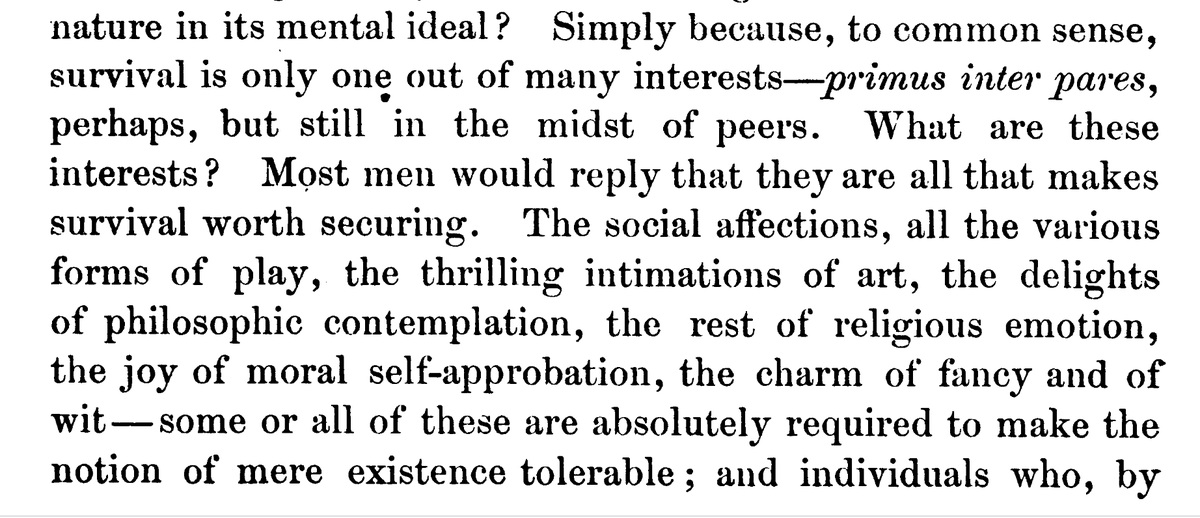
Fascinated by Kropotkin's ethical naturalism. K. argues that we have 2 drives that are at odds (a "double tendency")
* a tendency to community, mutual aid
* a tendency to individual self-realization, freedom
K's key idea is to achieve a synthesis between these 2 in society 1/
* a tendency to community, mutual aid
* a tendency to individual self-realization, freedom
K's key idea is to achieve a synthesis between these 2 in society 1/
Kropotkin did not think that one should give up individuality, personal initiative or freedom to achieve good societal ends. Rather, societies should strive to preserve these while also striving for the welfare of all. 2/
I'm really fascinated by his contributions to evolutionary ethics. Some things he anticipates: a kind of moral foundations theory, with evolved roots of morality being:
* sociality (sympathy)
* justice (wanting equality and justice)
* magnanimity (self-sacrifice) 3/
* sociality (sympathy)
* justice (wanting equality and justice)
* magnanimity (self-sacrifice) 3/
Kropotkin saw ethics as a result of evolved dispositions, (Ethics, 1922): "The impulse of a man who plunges into a river (even though unable to swim) in order to save another... cannot be explained in any other way than by the recognition of one’s equality with all others." /4
I think this is so reminiscent of Mengzi's child at the well (or Singer's drowning child)! @BryanVanNorden - did you know this thought experiment by Kropotkin? /5
Kropotkin's work has been ignored and dismissed, but I think it survives scrutiny quite well and is interesting to consider for contemporary ethical naturalists. For one thing, Kropotkin didn't think that our evolved human nature is static or has some sort of essence to it /6
He stressed the importance of mutual aid (notably in his Mutual Aid, 1902), the idea that in nature we have many non-zero-sum games and that regularly it benefits organisms to cooperate, and that we also see this in human society, see e.g. recent work
press.princeton.edu/books/hardcove… /7
press.princeton.edu/books/hardcove… /7
Also, I think he's right that if we think about how societies work, we should take into account human nature (not static, essentialized), to help people to realize individual projects and freedom without falling into a Malthusian nightmare of endless competition /8
A different early take on evolutionary ethics than social Darwinism. Kropotkin (Ethics, 1922), agrees with Herbert Spencer that ethics ought to be naturalized "Ethics, as Spencer very justly held, was to constitute one of the divisions of the general philosophy of nature." /9
Kropotkin expresses admiration for Spencer's synthetic philosophy (ha, @nescio13 you must've blogged about this?) where you have cosmology, biology, psychology, and then finally ethics as different levels of explanation/scientific research /10
So far so good, but Kropotkin's sticking point with Spencer is his focus on "struggle for existence", "Spencer did not at this time devote sufficient attention to the fact that in every class of animals some species show a development of mutual aid" /11
Kropotkin thought Spencer is just empirically wrong about the centrality of struggle/Malthusianism in evolution and speculates it is just an English cultural bias, he "accepts [struggle] with all its consequences, demands it as his right, tolerates no limits upon it." /12
And when you move from is to ought (which Kropotkin thought a legitimate move), it's very important to also look at the importance of cooperation in human evolution. I reproduce the relevant fragment from Ethics (1922) below /13 

Sources:
Secondary
tandfonline.com/doi/abs/10.108…
jstor.org/stable/231917
Primary
theanarchistlibrary.org/library/petr-k…
theanarchistlibrary.org/library/petr-k…
/end
Secondary
tandfonline.com/doi/abs/10.108…
jstor.org/stable/231917
Primary
theanarchistlibrary.org/library/petr-k…
theanarchistlibrary.org/library/petr-k…
/end
• • •
Missing some Tweet in this thread? You can try to
force a refresh



